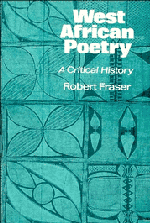Book contents
- Frontmatter
- Contents
- Acknowledgements
- West Africa: State borders and principal ethnic groupings
- Introduction
- 1 From oral to written verse: development or depletion?
- 2 Ladies and gentlemen
- 3 The négritude movement
- 4 Poetry and the university, 1957–63
- 5 The achievement of Christopher Okigbo
- 6 Continuity and adaptation in Ghanaian verse, 1952–71
- 7 Two Ijo poets
- 8 ‘Psalmody of sunsets’: The career of Lenrie Peters
- 9 The road to Idanre, 1959–67
- 10 The poet and war, 1966–70
- 11 The poetry of dissent, 1970–80
- 12 The return to orality
- A guide to availability
- Index
10 - The poet and war, 1966–70
Published online by Cambridge University Press: 03 May 2011
- Frontmatter
- Contents
- Acknowledgements
- West Africa: State borders and principal ethnic groupings
- Introduction
- 1 From oral to written verse: development or depletion?
- 2 Ladies and gentlemen
- 3 The négritude movement
- 4 Poetry and the university, 1957–63
- 5 The achievement of Christopher Okigbo
- 6 Continuity and adaptation in Ghanaian verse, 1952–71
- 7 Two Ijo poets
- 8 ‘Psalmody of sunsets’: The career of Lenrie Peters
- 9 The road to Idanre, 1959–67
- 10 The poet and war, 1966–70
- 11 The poetry of dissent, 1970–80
- 12 The return to orality
- A guide to availability
- Index
Summary
And ‘mid this tumult Kubla heard from far
Ancestral voices prophesying war!
Samuel Taylor Coleridge, ‘Kubla Khan’In the political and cultural evolution of West Africa the year 1966 was critical. At the end of 1965 the former colonial territories, both Anglophone and Francophone, seemed to be well advanced along the road of sovereignty and national progress. All of the former British possessions were now officially independent, and, although in 1958, all but one of the French territories had temporarily elected to stay within a loose economic community, the only absolute stranglehold which Europe retained in the area was in the still-enslaved Portuguese possessions of Guinea and Cape Verde, where wars of liberation still raged. By Christmas of that year, however, the horizon had assumed a louring aspect. In January 1966 a posse of army officers, led in the first instance by Major Emmanuel Ifeajuna, took over control in Nigeria, while in the following month President Kwame Nkrumah of Ghana was removed from power by a similar coup while absent on a state visit to China. In Lagos the dominating figure in the new military government soon emerged as Major-General J. T. U. Aguiyi-Ironsi who, when he announced plans to centralize the Federation by substituting ‘provinces’ for the existing semi-autonomous states, was himself ousted in a counter-coup on 29 July.
- Type
- Chapter
- Information
- West African PoetryA Critical History, pp. 251 - 272Publisher: Cambridge University PressPrint publication year: 1986



